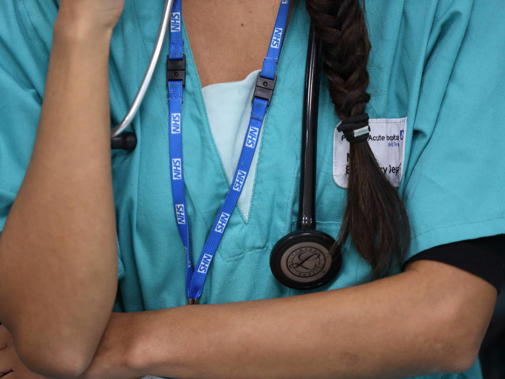It has been another turbulent year for our profession.
As improbable as it feels, this time last year, we had a different health secretary, the word 'Omicron' had not yet entered into general discourse, and driving to Barnard Castle was thought to be the worst breach of lockdown rules by our officials.
In just 12 months, it feels that so much – again – has changed.
It has been an extraordinary privilege to represent you – to advocate for our careers, our profession and our patients.
During the pandemic, junior doctors showed the care, compassion and commitment that highlights the very best of our profession – and did this at the darkest and most desperate of times. Junior doctors put the needs of the most unwell, the most vulnerable and the most alone before your own.
Whether in general practice, hospital wards or in the community, our working lives were turned upside down overnight.
And through all of this, our training and development took a back seat as we did whatever was needed to care for our patients.
When the country needed us most, we were there.
We were there, but who is there for us?
The truth is that the conditions which made this pandemic so brutal for those of us working in our NHS were here long before any of us had heard of COVID-19. The system was already breaking apart at the seams; already struggling to cope with so much demand, while resources evaporated before our eyes.
For years we have warned the Government and the health bodies that our working environments often push us to breaking point, despite supposedly being places of care and healing. Too often we are carelessly moved around like pawns – plugging gaps wherever required rather than being invested in in a way that recognises that we are the future of our profession.
Many of these issues were highlighted in the recent TV adaptation of Adam Kay’s book 'This is Going to Hurt', which shone a light on some of the most difficult aspects of our working lives and how isolating and traumatic our workplaces can be. While this was set a few decades ago, so much of it still rings true for those of us working in the NHS today.
It shone a light on to the effects working in an overstretched and underfunded NHS can have on individuals. We know the pandemic has only made this worse.
A recent BMA survey found that more than six in 10 doctors were suffering from stress and work-related anxiety, with two fifths saying their mental health was worse now than before the pandemic.
The pandemic and backlog have created an environment of chronic stress. Excessive workloads have been normalised by continuously requiring overstretched staff to fill gaps that should not exist.
Despite the fact that mental health issues are consistently the highest single category of sickness absence, seven in 10 doctors told us they would feel less comfortable applying for sick leave for mental health reasons.
In response to conference policy, the BMA junior doctors committee is developing a tool to ensure junior doctors are aware of their contractual rights around taking leave for mental health sickness reasons as well as providing information and myth-busting around fitness-to-practise thresholds.
 Dr Hallett
Dr Hallett
We have also written to NHS Employers, to call on them to state in their local sickness absence policies that doctors are within their rights to take days off for their mental health. Alongside this we continue to advertise and disseminate the wellbeing checklist to standardise wellbeing provisions for junior doctors, with a view to audit and hold employers to account.
Many of us have considered, during some of the dark days of recent years, whether the working lives we have chosen are really the right ones, for our families, for our finances, or for our wellbeing. The intensity of our jobs increases dramatically every year but there rarely seems to be any significant recognition for this.
It is in this environment where it is vital to have a seat at the table in the rooms where the decisions which affect our lives are made.
We have had the huge honour of representing tens of thousands of junior doctors in those rooms. In those rooms, no matter who it is we are meeting with, our collective voice holds power, because we as a trade union represent the views of working doctors throughout the country.
While there are many areas of great frustration and huge amounts of work to do, we have had significant successes.
Three years ago, our membership voted with an overwhelming majority to accept a new contract deal for junior doctors in England. It was a tremendously difficult period; the negotiations and the dispute were turbulent. But in the end, we reached an agreement that delivered genuine, tangible, progress for junior doctors’ terms and conditions and in our training. These changes finally reached completion in April, with the fifth nodal point fully implemented, with an additional £7,200 of basic pay per year for those at specialty trainee 6 and above.
Many of the other wins of the last six years have been just as significant: shared parental leave; increased flexibility in training; improvements to recruitment systems and to inter-deanery transfers; securing an extra £120m into what was supposed to be a closed pay envelope contract negotiation. All of this we have achieved by working together with stakeholders as a trade union that robustly represents and defends its members.
Recently we’ve secured yet more substantial agreements with the Department of Health and Social Care on behalf of members. Members in England who have faced delays to their training as a result of the sacrifices they have made in responding to the pandemic will now be compensated for the delay by starting further along the consultant pay scale.
This agreement could be worth £30,000 over the course of a doctor's career for a trainee delayed by a year. We have also responded to doctors' concerns about the end of section one transitional pay protection, agreeing an extension that protects these members from facing a significant financial cliff edge in August.
We are also working to secure better protection for pregnant doctors who work shift patterns. We have recently ensured that doctors who take parental leave are not forced to cover on-call shifts from during the period of annual leave accrued during their period away from the workplace, protecting against undue stress and unsafe working patterns during their return to work.
These discussions are never as straightforward as they might appear. It often feels like we have to fight tooth and nail for every incremental change. Many of these achievements we were told were not possible, and yet when working together, using our collective power, with conviction and policy behind us, we have succeeded.
As well as delivering important, incremental change for our members, our representatives and member relations staff have continued the most essential work we do as a union – representing and defending our members on the ground and in their workplaces. When faced once again with employers attempting to disregard our hard-won rights, the BMA was there by members' sides ensuring their safety was maintained and they were rewarded for their sacrifices.
As junior doctors, training is fundamental to our working lives. With the impact of COVID, the JDC has been working with statutory education bodies, medical royal colleges, trainee representative groups and the GMC to mitigate the effects of the pandemic on our training.
In particular we’ve worked closely with the education bodies to input into their training recovery plans to ensure we get training back on track – we are clear that without training today, there will be no medical workforce tomorrow. This has resulted in Health Education England securing an additional £30m from the Government for trainers and trainees to use to catch up on competencies.
 Dr Kemp
Dr Kemp
For the last few years, we have also been working with a number of stakeholders on greater flexibility of training and have secured several wins for our members. For example, from August 2022 all trainees in postgraduate medical specialties will have the opportunity to apply to train less-than full-time category 3 where junior doctors no longer need to give a reason for working flexibly.
Our colleagues in the devolved nations are also working hard to improve the working lives of junior doctors.
In Scotland, the wellbeing of junior doctors and the pressures faced across the country have been a priority, and they have been gaining significant traction, with articles across many of the major media outlets. Their wellbeing report and results of a snap rota survey generated national media coverage, and the chair of the BMA Scottish junior doctors committee has met with the Scottish Cabinet secretary, to press for better working conditions, and for the long overdue implementation of the 48-hour working week expert working group recommendations.
When the Scottish government unilaterally suspended rota monitoring, it was the intervention of SJDC that ensured that these vital safety mechanisms were reinstated. SJDC is also making headway on earlier release and educational approval of rotas through joint work with the Scottish government, NHS boards and NHS Education for Scotland.
In Wales, the Welsh BMA junior doctors committee is in the final stages of contract talks with NHS Wales Employers and the Welsh Government. It has also been reviewing study leave and working with stakeholders on a single lead employer for hospital trainees across Wales. This year will additionally see a pilot for a revised travel and relocation policy, which doubles the maximum allowance that can be claimed.
Despite the challenges associated with the political situation in Northern Ireland, the Northern Ireland BMA junior doctors committee has continued to make gains and stand up for the rights of junior doctors. This year, they have developed a Northern Ireland specific version of the fatigue and facilities charter, which will ensure that junior doctors have access to good quality rest facilities, no matter what time of the day or night they are working.
They’ve also launched a campaign to promote and value the work of junior doctors, with a particular focus on the effect COVID has had on training opportunities.
In England the contract review negotiations for junior doctors guaranteed a minimum 2 per cent increase each year for four years – enshrining annual uplifts higher than those seen since 2008. However, the contract was agreed before the pandemic started and when inflation was well below two per cent. The agreement crucially included a clause that would allow the pay agreement to be reviewed should circumstances change. Those circumstances certainly changed.
Last July the Government chose to exclude junior doctors from the full 3 per cent pay uplift. Even the pay review body agreed with us. But it says everything you need to know about the fairness of that process that the government ignored them as well.This was a slap in the face.
We therefore withdrew from the Review Body on Doctors' and Dentists' Remuneration process for junior doctors in England. This system is not fit for purpose and these pay awards do not reflect our value. A system that should be scrupulously fair has become a farce.
Six thousand junior doctors responded to our pay survey last August, with 96 per cent telling us the pay uplift was unacceptable, and 93 per cent telling us this was affecting their morale. The vast majority blamed the Government. It isn’t hard to see why.
The BMA has calculated that the estimated take-home pay for the average junior doctor in England has declined by 22.4 per cent in real terms between 2008 and 2021. A junior doctor is not worth a quarter less today than they were in 2008.
It is clear that after many years of undervaluing doctors, despite all we have given, that we will stand for this no longer.
There is a palpable change in the atmosphere and a growing sense of frustration and urgency in the opinions of our junior doctor members on the ground, that has been building across the last few months.
The change of mood and growing discontent among colleagues is reminiscent of the build up to the contract dispute in 2015. Tides changed quickly. Indeed, the last time we felt these similar stirrings, six months later we were soon organising picket lines.
History repeating itself could yet be avoidable for the Government. But the secretary of state for health and social care won’t even meet with us. We remember a previous secretary of state who refused to meet with us, and who underestimated junior doctors and the BMA at his peril.
This is an exciting time to be part of our trade union. That growing momentum, building on the efforts of our representatives throughout the country, means that more junior doctors than ever are running in our elections, and are keen to deliver change.
Junior doctors who weren’t previously politically active, are not just joining their trade union but getting involved, standing for positions, bringing new ideas and perspectives, with a common goal: improving all of our terms and conditions and our working lives.
That momentum must be felt throughout the country, however, and not just from BMA House in London. That is why, starting from last year, we have relaunched our pay campaign, with a focus on building from the grassroots and at a local level. We've produced materials to ensure all junior doctors understand the erosion that their pay has suffered, and we are building a network of hundreds of activists across the country.
Our members have also now sent thousands of letters to MPs with our pay ask for this year, as set by you at our conference last year. We have put this government on notice, and we will not be ignored any longer.
We stepped up when we were needed. But we are tired, we are undervalued, we are overworked and we are underpaid. And far too often, we are traumatised by our own workplaces.
It is time we are listened to. It is time we are shown the same care and compassion we are expected to provide to our patients.
With a seat at the table and a unified voice we have achieved so much. But there is still so much more work to be done.
Sarah Hallett and Mike Kemp are co-chairs of the BMA junior doctors committee

